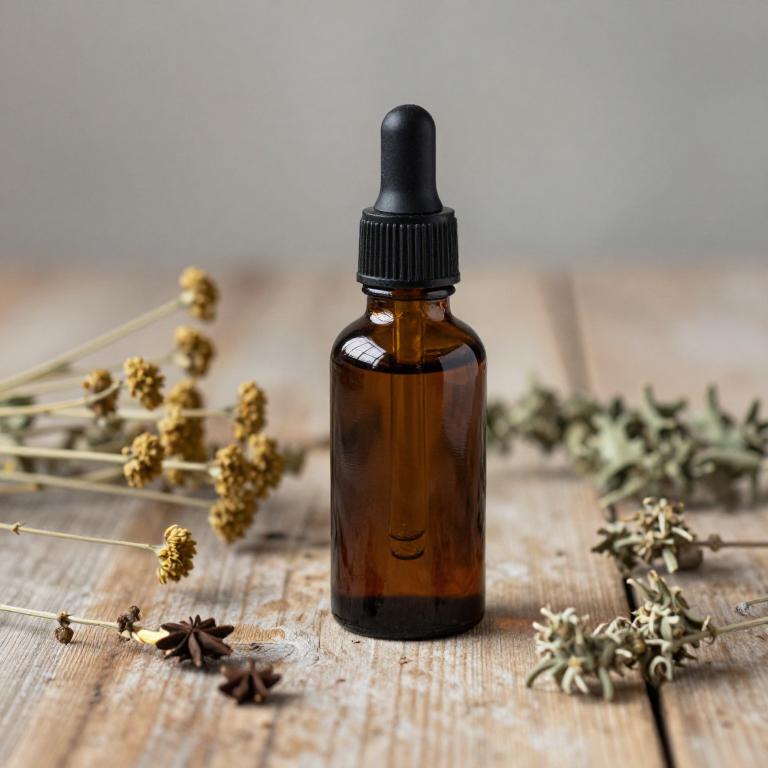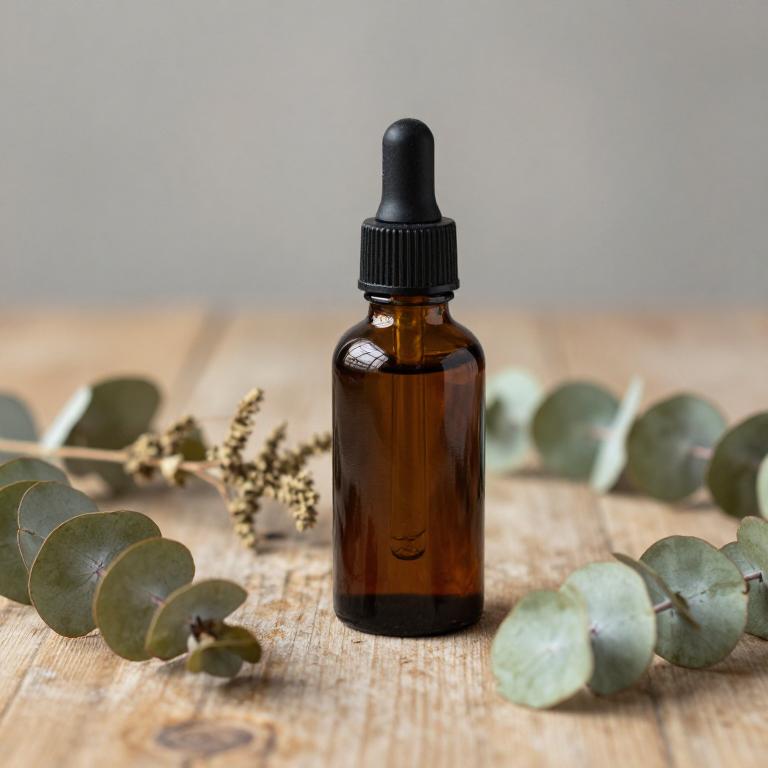10 Best Herbal Tinctures For Mucus In Throat

Herbal tinctures for mucus in the throat are concentrated liquid extracts made from various medicinal plants known for their mucolytic and anti-inflammatory properties.
Common ingredients include garlic, eucalyptus, thyme, and sage, which help to thin mucus and soothe irritated throat tissues. These tinctures are often used as natural alternatives to over-the-counter remedies for conditions like coughs, colds, and bronchitis. They can be taken orally or used as gargles to provide relief from congestion and discomfort.
However, it is important to consult with a healthcare professional before use, especially for individuals with allergies or existing medical conditions.
Table of Contents
- 1. Thyme (Thymus vulgaris)
- 2. Ginger (Zingiber officinale)
- 3. Peppermint (Mentha piperita)
- 4. Rosemary (Rosmarinus officinalis)
- 5. Salvia (Salvia officinalis)
- 6. Echinacea (Echinacea purpurea)
- 7. Stinging nettle (Urtica dioica)
- 8. Parsley (Petroselinum crispum)
- 9. Eucalyptus (Eucalyptus globulus)
- 10. Licorice (Glycyrrhiza glabra)
1. Thyme (Thymus vulgaris)

Thymus vulgaris, commonly known as thyme, is a popular herb used in traditional medicine for its antiseptic and expectorant properties.
Thyme tinctures are often employed to alleviate symptoms of mucus buildup in the throat due to their ability to loosen and expel phlegm. The essential oils in thyme, particularly thymol, have strong antimicrobial effects that can help reduce throat infections and inflammation. When taken as a tincture, thyme can be diluted with water or alcohol to make it safe for consumption and to enhance its therapeutic benefits.
However, it is important to consult with a healthcare professional before using thyme tinctures, especially for individuals with allergies or those taking other medications.
2. Ginger (Zingiber officinale)

Zingiber officinale, commonly known as ginger, has been traditionally used for its therapeutic properties, including its ability to alleviate mucus buildup in the throat.
Herbal tinctures made from fresh or dried ginger root are often prepared using alcohol as a solvent to extract the active compounds, such as gingerol and shogaol, which have anti-inflammatory and expectorant effects. These tinctures can help reduce throat irritation, loosen mucus, and ease coughing by stimulating the production of saliva and improving respiratory function. When used as a complementary therapy, ginger tinctures may support natural healing processes in the respiratory system.
However, it is advisable to consult a healthcare professional before using ginger tinctures, especially for individuals with allergies or those taking other medications.
3. Peppermint (Mentha piperita)

Mentha piperita, commonly known as peppermint, is often used in herbal tinctures to help alleviate symptoms of mucus buildup in the throat.
The essential oils in peppermint, particularly menthol, have expectorant properties that can help loosen and expel mucus from the respiratory tract. These tinctures are typically prepared by steeping dried peppermint leaves in alcohol, allowing the active compounds to be extracted for medicinal use. Peppermint tinctures may also provide a soothing effect due to their cooling and anti-inflammatory properties.
However, they should be used with caution, as they may cause irritation in some individuals, especially when taken in high concentrations or by those with certain medical conditions.
4. Rosemary (Rosmarinus officinalis)

Rosmarinus officinalis, commonly known as rosemary, has been traditionally used in herbal tinctures to help alleviate symptoms related to mucus buildup in the throat.
These tinctures are often prepared by steeping fresh or dried rosemary leaves in alcohol, allowing the active compounds, such as rosmarinic acid and cineole, to infuse into the liquid. The aromatic compounds in rosemary may help stimulate mucus clearance and soothe irritated throat tissues, making it a popular natural remedy for respiratory discomfort. While not a substitute for medical treatment, rosemary tinctures can support respiratory health when used as part of a holistic approach.
However, it is important to consult with a healthcare professional before using rosemary tinctures, especially for individuals with allergies or existing health conditions.
5. Salvia (Salvia officinalis)

Salvia officinalis, commonly known as sage, has been traditionally used in herbal medicine for its potential benefits in reducing mucus in the throat.
Sage tinctures are made by extracting the dried leaves of the plant with alcohol, creating a concentrated form of the herb that can be easily absorbed by the body. These tinctures are often used to soothe irritated throats and alleviate symptoms of excessive mucus production, such as coughing or a sore throat. The active compounds in sage, including thujone and flavonoids, may help reduce inflammation and thin mucus, making it easier to expel.
However, it is important to consult a healthcare professional before using sage tinctures, especially for prolonged periods or in individuals with certain medical conditions.
6. Echinacea (Echinacea purpurea)

Echinacea purpurea herbal tinctures are commonly used to support immune function and may help alleviate symptoms associated with respiratory conditions, including excess mucus in the throat.
These tinctures are derived from the dried flowers, leaves, and roots of the echinacea plant, which is native to North America. Some studies suggest that echinacea may reduce the duration and severity of colds and upper respiratory infections, potentially decreasing mucus production and improving throat comfort. However, the effectiveness of echinacea for specifically targeting mucus in the throat can vary, and it is often recommended as a complementary rather than a primary treatment.
As with any herbal remedy, it is important to consult with a healthcare provider before use, especially for individuals with allergies or chronic health conditions.
7. Stinging nettle (Urtica dioica)

Urtica dioica, commonly known as stinging nettle, is a medicinal plant that has been used for centuries in traditional herbal medicine.
Its tinctures are often prepared using alcohol to extract the plant’s active compounds, which may have anti-inflammatory and mucolytic properties. Some practitioners suggest that Urtica dioica tinctures may help reduce mucus buildup in the throat by promoting respiratory health and easing congestion. However, it is important to consult a healthcare professional before using these tinctures, as they can interact with certain medications or may not be suitable for everyone.
While anecdotal evidence supports its use, more scientific research is needed to fully understand its efficacy and safety for treating throat mucus.
8. Parsley (Petroselinum crispum)

Petroselinum crispum, commonly known as parsley, has been traditionally used in herbal medicine for its potential benefits in reducing mucus in the throat.
The tinctures made from this herb are believed to possess expectorant properties that help loosen and expel mucus from the respiratory tract. These tinctures may also contain compounds with mild anti-inflammatory and antimicrobial effects, which can soothe irritated throat tissues and reduce infection risk. When used as part of a holistic approach, parsley tinctures may offer natural relief for symptoms of coughs and throat congestion.
However, it is important to consult with a healthcare professional before using herbal tinctures, especially for prolonged or chronic conditions.
9. Eucalyptus (Eucalyptus globulus)

Eucalyptus globulus, commonly known as the Australian eucalyptus, is often used in herbal tinctures to help alleviate symptoms associated with excess mucus in the throat.
The tincture typically contains concentrated extracts of the plant's leaves, which are rich in compounds like cineole and other essential oils known for their expectorant and anti-inflammatory properties. When used as a throat spray or diluted in water, it can help loosen mucus, reduce congestion, and soothe irritated throat tissues. This natural remedy is particularly beneficial for individuals suffering from colds, bronchitis, or chronic throat inflammation.
However, it is important to consult a healthcare provider before use, especially for those with known allergies or underlying health conditions.
10. Licorice (Glycyrrhiza glabra)

Glycyrrhiza glabra, commonly known as licorice root, is a traditional herbal remedy that has been used for centuries to soothe throat irritation and reduce mucus production.
Its active compounds, such as glycyrrhizin and flavonoids, exhibit anti-inflammatory and expectorant properties, making it effective in alleviating symptoms of coughs and sore throats. When prepared as a tincture, glycyrrhiza glabra can be easily absorbed by the body, providing quick relief from excess mucus and throat discomfort. However, long-term use of licorice root tinctures may lead to side effects like hypertension due to its mineralocorticoid-like effects.
As a result, it is often recommended to use it under the guidance of a qualified herbalist or healthcare provider to ensure safe and effective use.